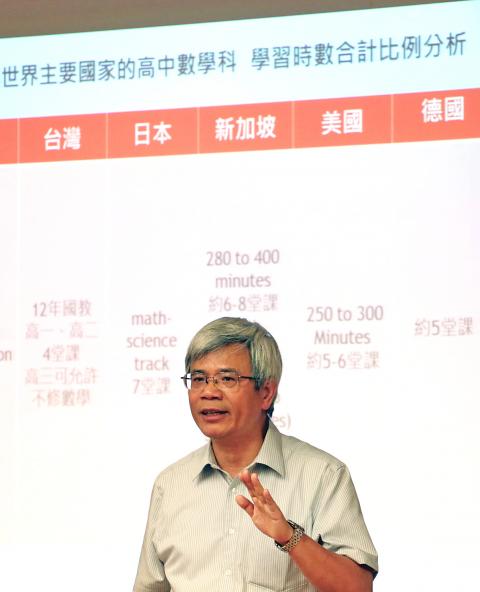Nearly 100 members of Academia Sinica have signed a petition against halving the required number of mathematics credits for senior-high school students as proposed in the draft 12-year national education program guidelines.
They said the reduced course load would weaken the nation’s competitiveness.
Four mathematicians who are also members of Academia Sinica held a press conference at National Taiwan University (NTU) in Taipei yesterday to announce that the petition, which calls on the government to reconsider its plan.

Photo: CNA
The petition has been signed by 93 academicians, including renowned historian Yu Ying-shih (余英時) and former Academia Sinica president Lee Yuan-tseh (李遠哲).
“Mathematics is widely recognized as a fundamental tool of science and technology” and a “math course is not only about attaining mathematical knowledge, but, more importantly, about training one in logical thinking and deductive ability,” the petition says.
Under the draft guidelines, the number of required math credits would be cut from 24 to 12 hours.
Math courses will only be required up to the first semester of grade 11 and become electives afterward, but “no country only requires senior-high school students to take math courses until the 11th grade,” NTU math professor Lin Chang-shou (林長壽) said.
“Allowing students to have one-and-a-half years where they do not have to take a math course could be seen as the state giving up on them,” he said.
While students from better-off families might be able reinforce their math education, students from disadvantaged families will be deprived of adequate education that could help them enter better universities, Lin said.
Yau Shing-tung (丘成桐), a former Harvard University professor and a Fields Medal winner, said the plan would damage the cultivation of Taiwan’s talented youngsters, because mathematics is the basis for excelling in science, engineering and other disciplines.
Yau showed journalists a letter from a Harvard professor about Taiwan’s plan to reduce the math course requirement, which reads: “that is shocking. In the US, high-tech companies are complaining that math education is too weak … have they considered what downgrading the role of math in high schools will do to Taiwan’s economic health?”
“Mathematic ability usually takes a long time to build up, so it is harder to reinforce the students’ ability after they enter college,” Harvard professor Yau Horng-tzer (姚鴻澤) said.
“But as more aspects of life are being digitalized, mathematic ability is becoming ever more important in various fields, including finance, biostatistics and big data,” Yau said.
National education should at least provide students with the basic ability to understand mathematics, and good mathematic skills also create high value-added industry for the nation, because the global trend is toward more dependence on digitalized technology, Yau said.
The petition’s supporters believe senior-high students should have at least four required credits of math each semester, two sets of math education programs designed for senior-high students of different learning orientations, and at least one math class per day for elementary and junior-high students, Lin said.
A mechanism to enhance the training of mathematics teachers to ensure teaching quality is also key, Lin said.

The CIA has a message for Chinese government officials worried about their place in Chinese President Xi Jinping’s (習近平) government: Come work with us. The agency released two Mandarin-language videos on social media on Thursday inviting disgruntled officials to contact the CIA. The recruitment videos posted on YouTube and X racked up more than 5 million views combined in their first day. The outreach comes as CIA Director John Ratcliffe has vowed to boost the agency’s use of intelligence from human sources and its focus on China, which has recently targeted US officials with its own espionage operations. The videos are “aimed at

STEADFAST FRIEND: The bills encourage increased Taiwan-US engagement and address China’s distortion of UN Resolution 2758 to isolate Taiwan internationally The Presidential Office yesterday thanked the US House of Representatives for unanimously passing two Taiwan-related bills highlighting its solid support for Taiwan’s democracy and global participation, and for deepening bilateral relations. One of the bills, the Taiwan Assurance Implementation Act, requires the US Department of State to periodically review its guidelines for engagement with Taiwan, and report to the US Congress on the guidelines and plans to lift self-imposed limitations on US-Taiwan engagement. The other bill is the Taiwan International Solidarity Act, which clarifies that UN Resolution 2758 does not address the issue of the representation of Taiwan or its people in

US Indo-Pacific Commander Admiral Samuel Paparo on Friday expressed concern over the rate at which China is diversifying its military exercises, the Financial Times (FT) reported on Saturday. “The rates of change on the depth and breadth of their exercises is the one non-linear effect that I’ve seen in the last year that wakes me up at night or keeps me up at night,” Paparo was quoted by FT as saying while attending the annual Sedona Forum at the McCain Institute in Arizona. Paparo also expressed concern over the speed with which China was expanding its military. While the US

SHIFT: Taiwan’s better-than-expected first-quarter GDP and signs of weakness in the US have driven global capital back to emerging markets, the central bank head said The central bank yesterday blamed market speculation for the steep rise in the local currency, and urged exporters and financial institutions to stay calm and stop panic sell-offs to avoid hurting their own profitability. The nation’s top monetary policymaker said that it would step in, if necessary, to maintain order and stability in the foreign exchange market. The remarks came as the NT dollar yesterday closed up NT$0.919 to NT$30.145 against the US dollar in Taipei trading, after rising as high as NT$29.59 in intraday trading. The local currency has surged 5.85 percent against the greenback over the past two sessions, central